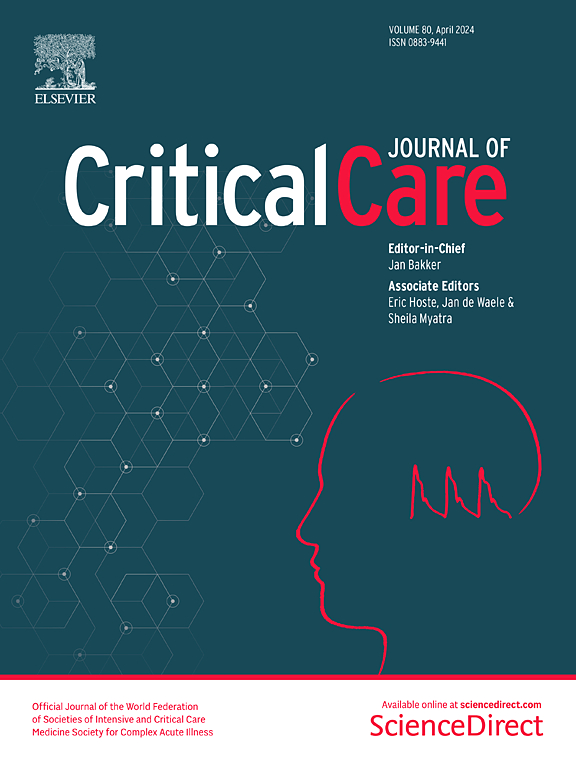体外膜氧合在成人创伤合并难治性急性心肺衰竭患者中的应用:中国体外生命支持学会2025指南
IF 9.3
1区 医学
Q1 CRITICAL CARE MEDICINE
引用次数: 0
摘要
成人外伤合并难治性急性心肺功能衰竭的发病率和死亡率都很高。在过去的十年中,越来越多的研究表明体外膜氧合(ECMO)对创伤患者的生存益处,这些患者对最佳损伤控制复苏(DCR)没有反应,并且有机会制定临床实践指南来指导临床医生在床边实施创伤ECMO。中国体外生命支持学会(CSECLS)召集了一个国内跨学科专家小组,根据世界卫生组织(WHO)指南制定手册的原则和利益冲突政策,制定了本指南。与创伤ECMO使用有关的临床关键问题通过专家访谈和文献综述获得,并制定为PICO(人口/干预/比较/结果)格式,用于文献检索支持该问题的原始研究。然后,小组成员被分配处理特定的临床问题,综合证据,制定建议并确定其强度,遵循建议评估,发展和评估(GRADE)框架。指南指导委员会和利益相关者批准了最终文件。针对创伤性ECMO在成人患者中的应用,提出了11项建议,重点关注以下主题:(1)适应证;(2)患者筛查;(三)启动时间;(4)多学科方法;(5)外伤ECMO管理;(6)并发症预防。详细阐述了支持证据,并对临床应用和未来研究提出了专家意见。尽管证据体的质量很低或非常低,但大多数研究表明,ECMO可以提高具有不同损伤机制的成人创伤患者的生存率。然而,决策应考虑个体特征、益处和潜在危害、患者的价值观和偏好以及长期结果。本文章由计算机程序翻译,如有差异,请以英文原文为准。
Use of extracorporeal membrane oxygenation in adult trauma patients with refractory acute cardiopulmonary failure: guideline from the Chinese society of extracorporeal life support 2025
Adult trauma patients with refractory acute cardiopulmonary failure suffer from high morbidity and mortality. In the past decade, a growing body of researches has shown survival benefits of extracorporeal membrane oxygenation (ECMO) in trauma patients who fail to respond to optimal damage control resuscitation (DCR), and there is an opportunity to formulate clinical practice guidelines to guide clinicians in implementing trauma ECMO at the bedside. The Chinese Society of Extracorporeal Life Support (CSECLS) convened a domestic panel of interdisciplinary experts to develop this guideline, adhering to the principles of the World Health Organization (WHO) Manual for Guideline Development and the policy of conflict of interest. Clinical key questions pertaining to trauma ECMO use were informed from expert interviews and literature reviews, and formulated as PICO (Population/Intervention/Comparison/Outcome) format for literature retrieval of original studies supporting the question. Then, panelists were assigned to address specific clinical questions, synthesize evidence, formulate recommendations and determine their strength, following the Recommendations Assessment, Development and Evaluation (GRADE) framework. The guideline steering committee and stakeholders approved the final document. Eleven recommendations regarding trauma ECMO use in adult patients were formulated, focusing on the following topics: (1) indications; (2) patient screening; (3) timing of initiation; (4) multidisciplinary approach; (5) trauma ECMO management; and (6) complication prevention. Supporting evidences are elaborated in detail, and expert opinions on clinical application and future research provided. Although the quality of the body of evidence is low to very-low, most researches have shown that ECMO improves the survival of adult trauma patients with varied injury mechanisms. However, decision-making should consider the individual characteristics, benefits and potential harms, patients’ values and preferences, and long-term outcomes.
求助全文
通过发布文献求助,成功后即可免费获取论文全文。
去求助
来源期刊

Critical Care
医学-危重病医学
CiteScore
20.60
自引率
3.30%
发文量
348
审稿时长
1.5 months
期刊介绍:
Critical Care is an esteemed international medical journal that undergoes a rigorous peer-review process to maintain its high quality standards. Its primary objective is to enhance the healthcare services offered to critically ill patients. To achieve this, the journal focuses on gathering, exchanging, disseminating, and endorsing evidence-based information that is highly relevant to intensivists. By doing so, Critical Care seeks to provide a thorough and inclusive examination of the intensive care field.
 求助内容:
求助内容: 应助结果提醒方式:
应助结果提醒方式:


